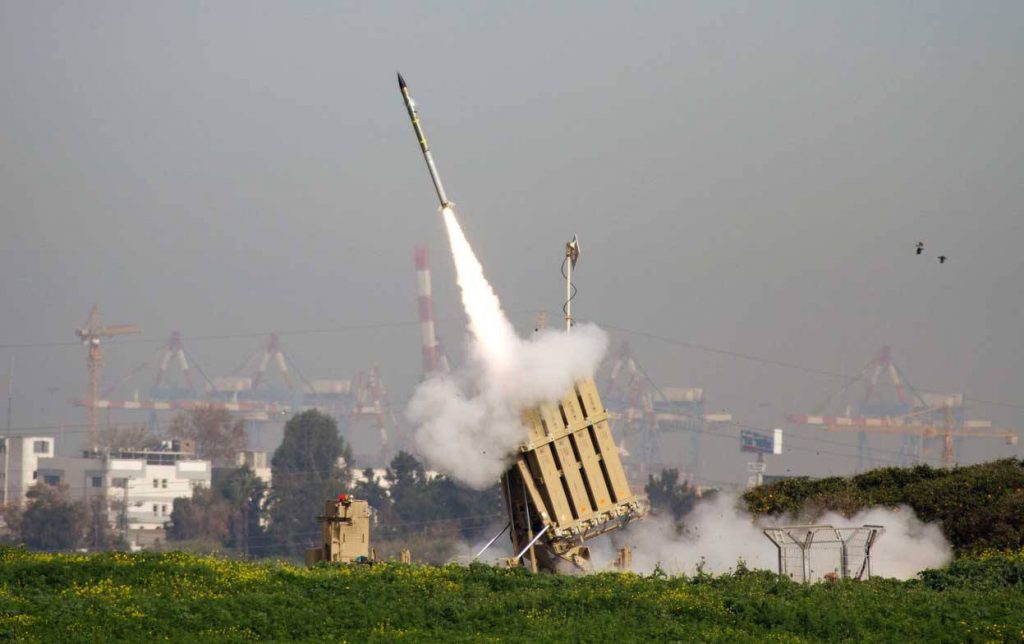Australia/Israel Review
Scribblings: Iron Dome for Ukraine?
Mar 30, 2022 | Tzvi Fleischer

Ukrainian President Volodymyr Zelensky is an unlikely yet amazing modern-day hero. Despite previously having been an entertainer with no political experience, and despite the fact that he was struggling severely in the polls before the unprovoked Russian invasion of his country, he has become the man of the hour. In a story that ostensibly belongs in a movie script or novel, he has risen to the moment remarkably since his country’s very existence came under attack from Russia in late February. If Ukraine improbably succeeds in holding off the Russian onslaught, as is looking increasingly possible, he will deserve a great deal of the credit.
Having said all this, nobody is perfect, and Zelensky made some mistakes when he addressed Israel’s Knesset virtually on March 20. His speech was poorly received – and thus would not have served his aims of gaining greater military and diplomatic support from the Jewish state. Part of the problem was his hectoring tone – but more important was his repeated and unfortunate use of Holocaust comparisons to call attention to Ukraine’s plight.
Comparing Russia’s invasion of Ukraine to Hitler’s “Final Solution”, and saying that Israel should save Ukrainians like Ukrainian Righteous Among the Nations saved Jews during the Holocaust, was neither wise nor helpful – as numerous Israeli leaders noted in its aftermath.
In addition, Zelensky asked for Israeli “missile defence systems”, presumably meaning Israel’s much discussed Iron Dome anti-missile system.
While it is understandable, given his country’s plight, that he requested the world-leading missile defence system developed by Israel and the US, there are solid reasons why this is not really a practical request.
It is true that Israel appears to fear the Russian reaction that may come if it should supply military aid to Ukraine and so far is not doing so – though it is supplying ample aid of other sorts, especially medical. But Iron Dome would not be a realistic way to help Ukraine militarily in any case – at least, not unless the war drags on for many months.
Iron Dome is a very expensive and complex system. According to the website, the Strategy Page: “Each [Iron Dome] battery has radar, control equipment, and 3-4 missile launchers (each with 20 missiles) and costs about [US]$37 million to 50 million depending on how many missiles it is shipped with . . . if the computers predict a rocket coming down in an inhabited area one (or often two to be sure) [US]$50,000 Tamir guided missiles are fired to intercept the rocket.”
Israel itself currently has only a reported 10 such batteries – and has not managed to get to the 15 batteries it said it wanted to protect the whole country in 2014. The batteries are thus moved around to protect different areas.
Israel also used up much of its stock of Tamir interceptors during the missile barrages from Gaza during the war with Hamas last May, and has been struggling to replace them.
In other words, Israel does not have spare Iron Dome batteries lying around to give to Ukraine, even if it wanted to.
Nor is it clear how it would even get one to Ukraine. It probably couldn’t be sent by air. The one time in history a complete Iron Dome system was flown – from the US to Israel in 2020 – the largest plane in the world was used, the Antonov 225 cargo plane. But the only Antonov 225 ever made was destroyed in a Russian attack outside Kyiv on Feb. 24. Nor would it do to send a dismantled system through the contested airspace of war-torn Ukraine.
It would also be hard to ship by sea – the Russian Navy controls access to all of Ukraine’s Black Sea ports.
But let’s hypothesise that Israel was prepared to sacrifice some of its own security, despite the massive missile inventories threatening it owned by Hamas in Gaza and Hezbollah in Lebanon, and give Ukraine one of its Iron Dome batteries. Let’s further imagine a way could be found to get it to the Ukrainian military and further imagine the Ukrainians could be trained to use it, a process that usually takes months. Would it help Ukraine much?
According to its manufacturer, each Iron Dome battery can defend an area of “up to nearly 60 square miles [155 km sq.]” – which is not much compared to Ukraine’s 603,548 km sq. But even to defend a city, say Kyiv, the battery would likely not be that useful, and also almost certainly not useful for very long.
Russia has a huge inventory of missiles – and could quickly overwhelm and exhaust a single Iron Dome battery. It also has advanced missiles, such as the hypersonic missiles it has already reportedly been deploying in Ukraine, that Iron Dome would be unable to stop. Russia could either destroy the battery with such missiles or with artillery, or else quickly exhaust its supply of Tamir interceptors by firing many missiles at the area. And as noted, Israel does not have enough of those for itself at the moment and would not be able to give Ukraine more.
There may be a case for Israel to do more for Ukraine – and there are certainly people in Israel making that argument. However, while Iron Dome may be amazing cutting-edge technology which showcases Israel’s ability to use hi-tech to overcome its major security dilemmas in original ways, it is not a sensible answer to Ukraine’s admittedly desperate military needs.






